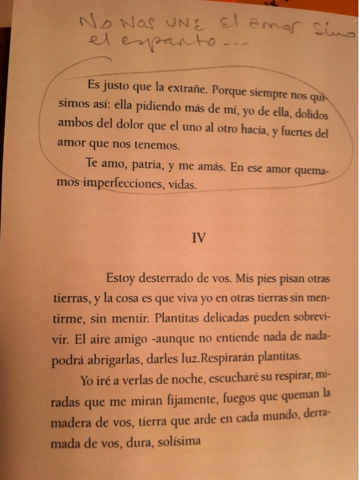Buenas personas, pero poetas
malos. Dos, cien, mil malos
poetas
se necesitan más para que
estallen
las diez mil flores del poema.
Que en ellos viva la poesía,
la innecesaria, la fútil, la sutil
poesía imprescindible. O la in-
versa: la poesía necesaria,
la prescindible para vivir.
Que florezcan diez maos en el
pantano
y en la barranca un Ele, un Juan,
un Gelman como elefante entero de
cristal roto,
o un Rojas roto, mendigando
a la Reina de España.
(Ahora España
ha vuelto a ser un reino y tiene
Reina,
y Rey del reino. España es un
tablero
de alfiles politizados y peones
recién comidos: a la derecha,
negros, paralizados, fuera del juego).
Y aquí hay torres de goma, alfiles
politizados y damas policiales
vigilando la casa.
A la caza del hombre,
por hambre, corren todos, saltan
de la cuadrícula y son comidos.
Todo eso abunda: faltan los
poetas,
los mil, los diez mil malos, cada
uno
armado con su libro de mierda.
Faltan,
sus ensayitos y sus novela en
preparación.
Ah.. y los curricola,
y sus diez mil applys nos faltan.
No es la muerte del hombre, es
una gran ausencia
humana de malos poetas. Que
florezcan
cien millones de tentativas
abortadas,
relecturas, incordios,
folios de cartulina,
ilustraciones
de gente amiga, cenas
con gente amiga, exégesis,
escolios,
tiempo perdido como todo.
Se necesitan poetas gay, poetas
lesbianas, poetas
consagrados a la cuestión del
género,
poetas que canten al hambre, al
hombre,
al nombre de su barrio, al arte y
a la industria,
a la estabilidad de las
instituciones,
a la mancha de ozono, al agujero
de la revolución, al tajo agrio
de las mujeres, al latido
inaudible del pentium y a la
guerra
entendida como continuidad de la
política,
del comercio,
del ocio de escribir.
Se necesitan Betos, Titos, Carlos
que escriban poemas. Alejandras y
Marthas
que escriban. Nombres para
poetas,
anagramas, seudónimos y
contraseñas
para el chat room del verso se
necesitan.
Una poesía aquí del cirujeo en la
veredas.
Una poesía aquí de la mendicidad
en las instituciones.
Una poesía de los salones de
lectura de versos.
Una poesía por las calles (venid
a ver
los versos por las calles...)
Una poesía cosmopolita (subid a
ver
los versos por la web...).
Una poesía del amor aggiornado
(bajad a ver
poesía en el pesebre del amor...)
Una poesía explosiva: etarra,
ética,
poéticamente equivocada.
En los papeles, en los canales
culturales de cable, en las
pantallas
y en los monitores, en las
antologías y en revistas
y en libros y en emisiones
clandestinas
de frecuencia modulada se buscan
poetas y más malos poetas:
grandes poetas celebrados
pequeños,
poetas notorios, plumas iluminadas,
hombres nimios, miméticos,
deteriorados por el alcohol,
descerebrados por la droga,
hipnotizados por el sexo
idiotizados por el rock,
odiados, amados por la gente
aquí.
En las habitaciones se buscan.
En un bar, en los flippers,
en los minutos de descanso de la
oficina,
entre dos clases de gramática,
en clase media, en barrios
vigilados se buscan.
¿Habrá en la tropa?
¿En los balnearios, en los baños
públicos que han comenzado a
construir?
¿En los certámenes de versos?
¿En los torneos de minifútbol?
¿Bajo el sol quieto?
¿A solas con su lengua?
¿A solas con una idea repetitiva?
¿Con gente?
¿Sin amor?
No es el fin de la historia, es
el comienzo de la histeria
lingual.
Todo comienza y nace de una
necesidad fraguada en la lengua.
Falsifiquemos el deseo:
Te necesito nene.
Para empezar te necesito.
Para necesitar, te pido
ese minuto de poesía que
necesito, necio:
quisiera ver si me devuelves el
ritmo de un mal poema,
que me acarices con sus ripios,
que me turbes la mente con otra
idea banal,
y que me bañes todo con la
trivialidad del medio.
Y en medio del camino, en el
comienzo
de la comedia terrenal, quiero
vivir
la necedad y la necesidad
de un sentimiento falso.
Se necesitan nuevos sentimientos,
nuevos pensamientos imbéciles,
nuevas
propuestas para el cambio, causas
para temer, para tener,
aquí en el sur.
Y arriba España es un panal
de hormigas orientales:
rumanas, tunecinos,
suecas a la sombra de un Rey.
Riámonos del Rey.
De su fealdad.
De su fatalidad.
De Su Graciosa Realidad.
La realidad es un ensueño
compartido.
La realidad de España
es su filosa lengua pronunciando
la eñe
y su mojada espada pronunciando
el orden
del capital y la sintaxis.
¡Ay, lengua:
aparta de mí este cuerno de la
prosperidad clavado en tu ingle,
suturada de chips, y cubre
nuestras heridas con el bálsamo
de los malos poemas..!
(2002) Rodolfo Fogwill











